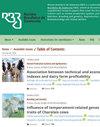饲喂全油籽的饲养场内洛尔幼牛生产经济性能
IF 1.2
4区 农林科学
Q3 Agricultural and Biological Sciences
Revista Brasileira De Zootecnia-Brazilian Journal of Animal Science
Pub Date : 2023-09-15
DOI:10.37496/rbz5220220160
引用次数: 0
摘要
-测定了饲粮中添加油籽的影响,以评估育肥场Nellore幼牛的生产和经济参数。选用24月龄、初始体重为311.46±0.37 kg的Nellore公公牛24头,采用完全随机设计,随机分布在4 × 20 m的单栏内,共4个处理,每个处理6个重复。试验评价了4种饲粮(对照,以玉米和豆粕为基础,3种饲粮含有棉籽、大豆和向日葵)。每日测定采食量和采食量,计算采食量和成本。对照组干物质采食量分别高于大豆(10.64 kg/d)、棉花(9.88 kg/d)和向日葵(9.30 kg/d)处理。棉籽处理的平均中性洗涤纤维摄入量最高。饮食对平均日增重、总增重和最终体重都有影响。大豆处理表现出最高的生产性能、总增重(232.55 kg)和末重(544.38 kg)。食用油籽可以改变肉中的脂肪酸分布,降低肉中饱和脂肪酸的含量。全大豆种子有利于提高生产性能,提高饲料效率,改善脂肪酸分布,改善胴体脂肪分布,降低生产成本。本文章由计算机程序翻译,如有差异,请以英文原文为准。
Productive and economic performance of feedlot young Nellore bulls fed whole oilseeds
- The effects of diets containing oilseeds were measured to evaluate the productive and economic parameters in the finishing of young, feedlot Nellore bulls. Twenty-four young Nellore bulls were used, with an initial body weight (BW) of 311.46±0.37 kg and 24 months of age, distributed into individual stalls (4 × 20 m) in a completely randomized design, totaling four treatments with six repetitions per treatment. Four diets (control, based on corn and soybean meal, and three diets containing cottonseed, soybean, and sunflower) were evaluated. Feed and orts were measured daily to calculate intake and costs. The dry matter intake of the control group was higher than soybean (10.64 kg/day), cotton (9.88 kg/day), and sunflower (9.30 kg/day) treatments, respectively. The cottonseed treatment showed the highest average neutral detergent fiber intake. There was a dietary effect of diets on average daily gain, total weight gain, and final weight. The soybean treatment showed the highest performance, total gain (232.55 kg), and final weight (544.38 kg). Oilseed intake can modify the fatty acids profile in the meat, decreasing its saturated fatty acid content. Whole soybean seed favors performance, improves feed efficiency, fatty acid profile, and fat distribution in the carcass, and can reduce production costs.
求助全文
通过发布文献求助,成功后即可免费获取论文全文。
去求助
来源期刊
CiteScore
1.90
自引率
0.00%
发文量
25
审稿时长
8 weeks
期刊介绍:
The Revista Brasileira de Zootecnia (RBZ; Brazilian Journal of Animal Science) encompasses all fields of Animal Science Research. The RBZ publishes original scientific articles in the areas of Aquaculture, Biometeorology and Animal Welfare, Forage Crops and Grasslands, Animal and Forage Plants Breeding and Genetics, Animal Reproduction, Ruminant and Non-Ruminant Nutrition, and Animal Production Systems and Agribusiness.

 求助内容:
求助内容: 应助结果提醒方式:
应助结果提醒方式:


